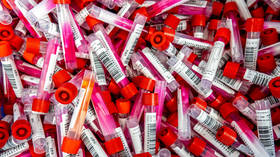Worth a shot: Scientists discover way to quickly clear alcohol from blood by… breathing

A team of Canadian researchers have developed an incredible system to reduce blood-alcohol levels three times faster than normal, using a simple, briefcase-sized device which could save millions of lives worldwide each year.
The group of scientists, led by Dr. Joseph Fisher at the University Health Network, a medical research organization in Toronto, Canada, were exploring treatments for acute alcohol intoxication when they happened upon a novel solution that generated more than a few sighs of disbelief at how simple it was.
“It's almost inexplicable why we didn't try this decades ago,”says Fisher.
The new method involves recruiting the lungs to hyperventilate excess alcohol out of the body, which assists the liver in reducing alcohol levels in a patient’s bloodstream.
The only existing method to remove alcohol from the blood is through dialysis (the process of removing excess water, solutes, and toxins from the blood) but this wouldn’t be applicable in cases of extreme alcohol consumption as it takes too long. In most cases, the patient’s liver handles roughly 90 percent of alcohol processing within their body, at a constant rate that typically cannot be adjusted externally.
Somewhat amazingly, this novel breathing technique reduced blood-alcohol levels three times faster than just the liver working away on its own.
“But you can't just hyperventilate, because in a minute or two you would become light-headed and pass out,” cautions Dr. Fisher. That’s where his team’s device comes into play.
Also on rt.com Drinking on an empty stomach? You might have ‘drunkorexia’ and should question your relationship with alcohol. Here’s whyHyperventilation eliminates carbon dioxide (CO2) from the blood along with the alcohol, but rapid decreases in CO2 levels in the blood can cause light-headedness to the point of fainting; not ideal for treating at-risk patients.
To mitigate this loss of consciousness, Fisher and his team developed a briefcase-sized device to safely reintroduce the required amount of CO2 back into the bloodstream to normal levels, and consciousness, in spite of the hyperventilation.
“It's a very basic, low-tech device that could be made anywhere in the world: no electronics, no computers or filters are required,” Fisher says, adding that, at present, the device is only a proof of concept used by laboratory volunteers. He and his fellow authors recommend further studies to investigate its possible use in a clinical setting.
According to the World Health Organization, some three million deaths worldwide per year can be attributed to alcohol abuse, accounting for 5.3 percent of all deaths worldwide, so this new briefcase device could prove to be an unprecedented lifesaver.
Also on rt.com Alcohol damages DNA, increases cancer risk - studyLike this story? Share it with a friend!












